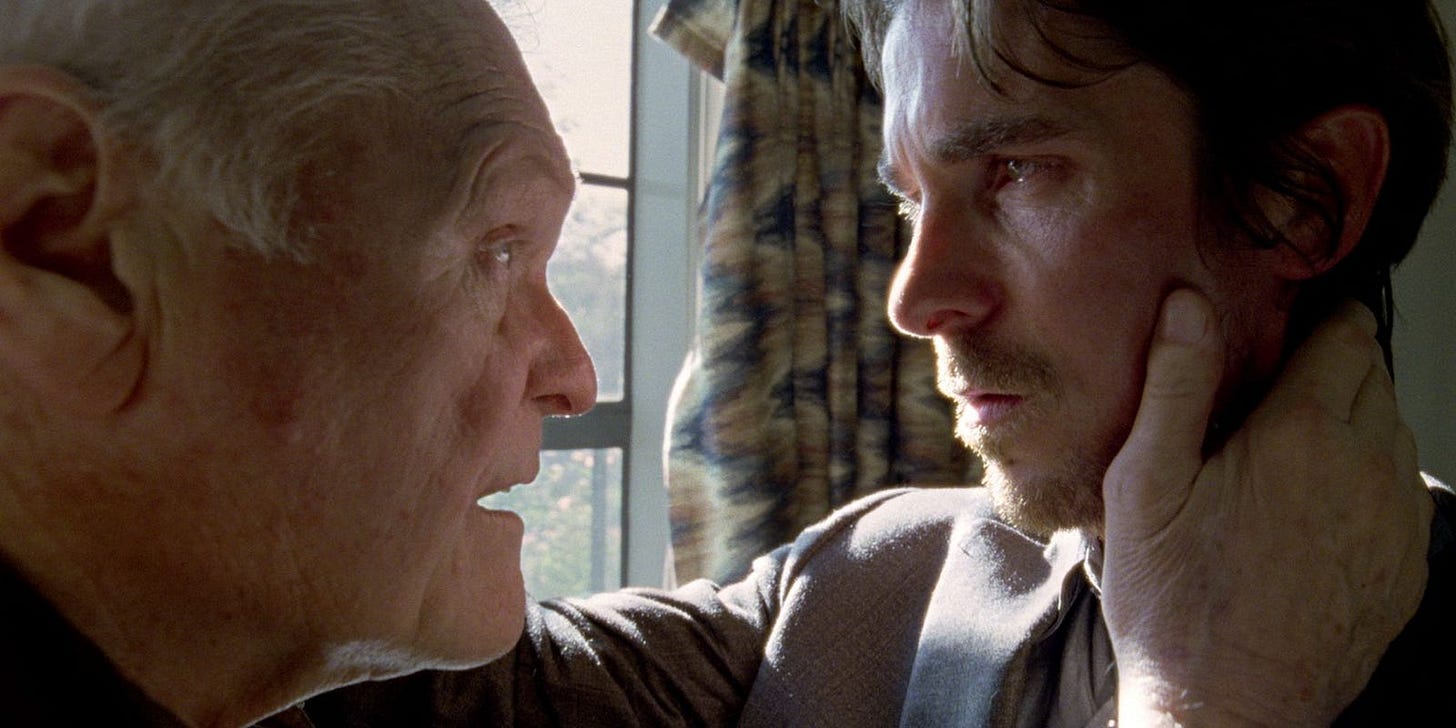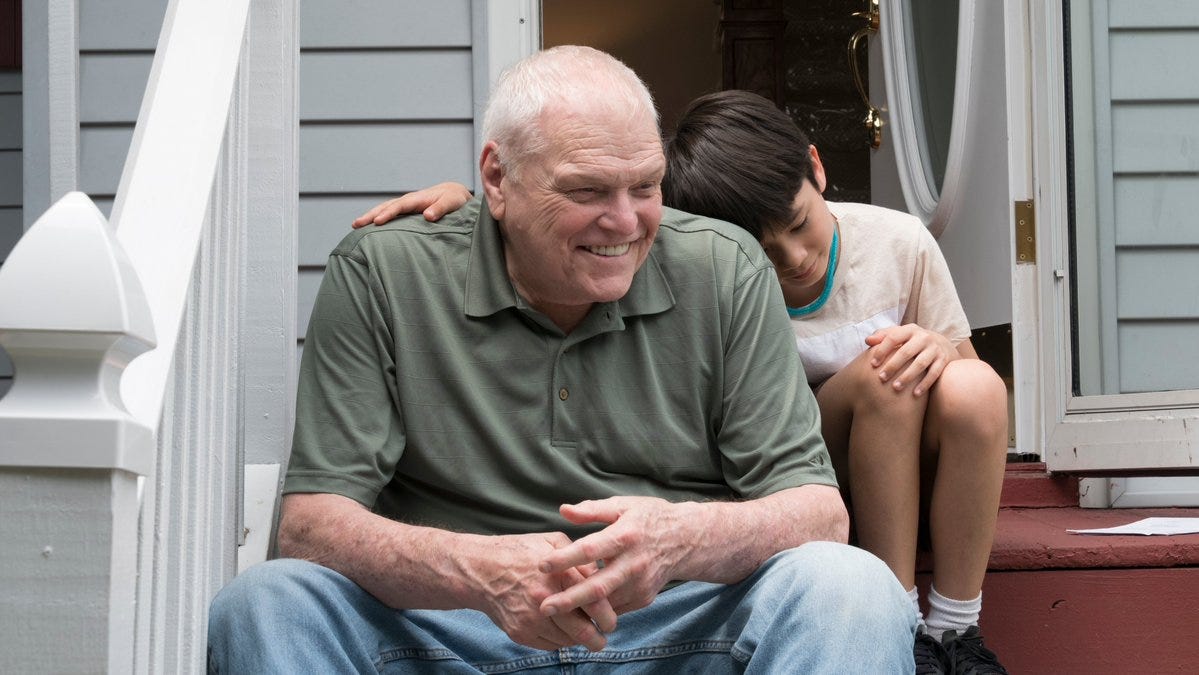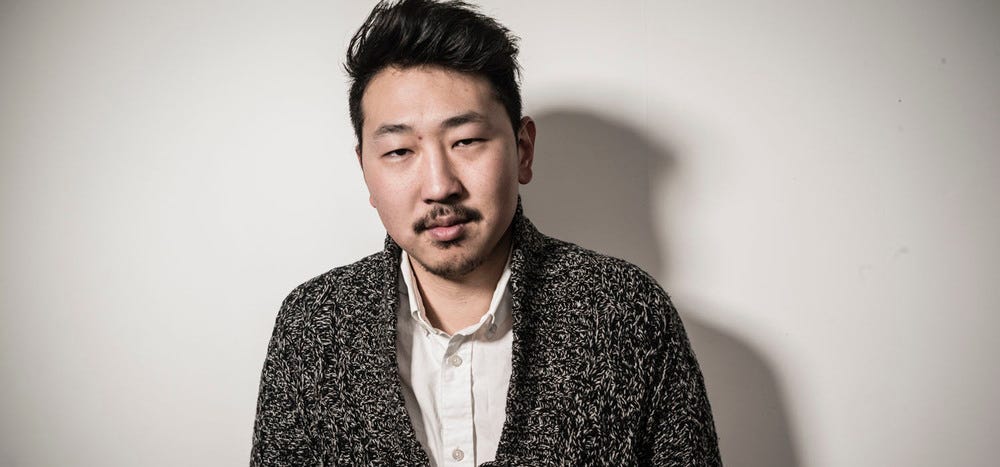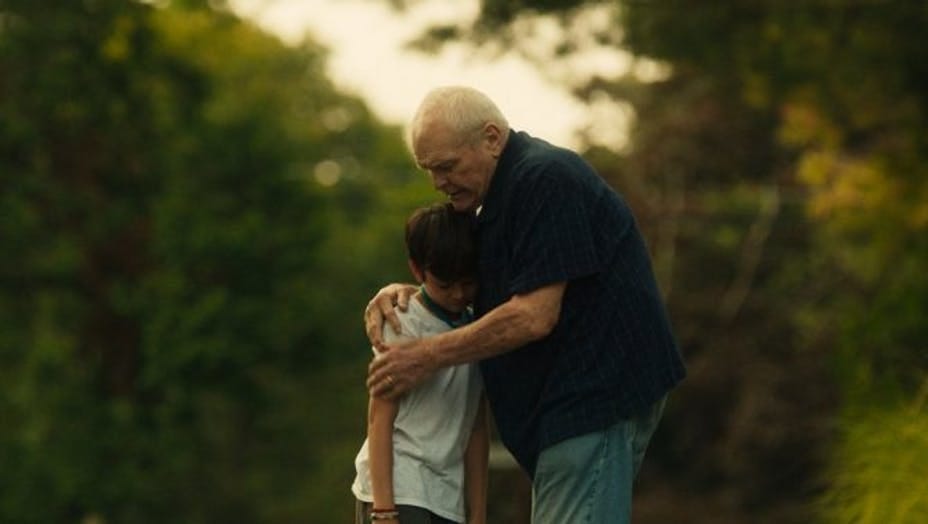Remembering Brian Dennehy
DRIVEWAYS director Andrew Ahn reflects on working with the acting legend in his final leading role

In the 1983 Cold War thriller Gorky Park, Brian Dennehy plays an American detective looking for revenge in Soviet Russia. It’s a supporting role but a memorable one nevertheless, not only for the relentlessness he brings to the part but also for the deep aching sadness that hides underneath his gruff exterior. At one point, this bear of a character thoroughly pummels William Hurt’s vampiric-looking Communist state police officer, who later describes his western opponent as having “fists made of stone.”
Standing 6’3’’ and looking like an upright buffalo ready to charge, Dennehy always seemed like he could crush someone with the slightest effort. But in reality, he was a performer of great tenderness and nuance who often embraced roles that demanded so much more than an imposing frame.
Brian Dennehy passed away on April 15, 2020, at the age of 81. The loving, career-spanning remembrances that have been published in the week since speak to his indelible reputation as an actor versatile enough to have made an impact across three different artistic mediums (stage, film, television) over four decades of work.
I remember Dennehy most fondly in the studio comedy Tommy Boy (1995). He played Chris Farley’s patient and frustrated father who unconditionally loves his clumsy big oaf of a son no matter how difficult things get. More recently, Dennehy tackled a far more complex patriarchal role in Terrence Malick’s Hollywood-land masterpiece Knight of Cups (2015), providing nothing less than the film’s sublime emotional core amid countless tremors of uncertainty emanating from Christian Bale’s wandering forlorn scriptwriter.

Dennehy starred in over 180 productions since the mid-70s, including films of all genres and budgets, theater productions of varying scale and ambition, and television shows and movies ranging in quality. But he will be remembered most for two legendary Tony Award-winning performances in Arthur Miller’s Death of Salesman and Long Day’s Journey Into Night, both vivid collaborations with theater director Robert Falls.
It is my hope that Dennehy’s last leading role in director Andrew Ahn’s wonderful 2019 independent film Driveways will someday be mentioned in the same breath. His performance as Del infuses a man of few words with great wisdom and stature. People like and respect him. Having retired long ago, he has settled into a comfortable life of routine. Yet, Del soon realizes that newfound connection is still possible after meeting two strangers, single mother Kathy (played by Hong Chau) and her young son Cody (Lucas Jaye), who’ve just begun cleaning out the cluttered house next door that was owned by Kathy’s now-deceased sister.
Driveways isn’t a showy film, but it’s a stunner all the same. It reveals our organic need for fresh experiences and interpersonal relationships (I can’t think of a better quarantine refresher) in times of psychological crisis. Del, Kathy, and Cody are good people going through tough times of transition and doing the best they can to be content despite it all. After building a well of subtext for nearly the entire run time, Driveways ends with a titanic six-minute monologue scene between Del and Cody that showcases Dennehy’s spirit as an actor. It’s truly a tearjerker worth crying over.
During an admittedly difficult time of mourning, I spoke with Andrew Ahn via Zoom about his experiences working with Brian Dennehy on Driveways. Our talk covered a great many topics, including Dennehy’s acting process, his love of community, and the undeniable energy and vitality he brought to the production, not to mention the friendships he made along the way. I hope you enjoy it and take this opportunity to watch Driveways (one of 2020’s lone bright spots) and seek out more of Brian Dennehy’s work in general.

GLENN HEATH JR.: I know this is a tough time so thank you for speaking with me. What was your impression of Brian Dennehy as an actor before Driveways? Were you familiar with his work on stage or in films? Any specific performances?
ANDREW AHN: I knew Brian from his film work, but from very random movies. I had seen First Blood and a childhood favorite of mine was Tommy Boy. I recognized him very quickly because he has such a presence on screen. I had never seen any of his stage work but was familiar with his reputation there. I knew he had won two Tony Awards. I was very familiar with the fact that this was a man that could pull off a long monologue. When we started talking with Brian about Driveways I wanted to see more of his work. The first film I decided to watch was Peter Greenaway’s film The Belly of an Architect because it was a leading role and seemed so different from the rest of his body of work. It’s such a weird movie and he’s so good. It’s just wild, a real filmmaker’s film. There’s a lot of fascinating aesthetic choices, and the film is very cerebral. Brian was such an intelligent actor but also undeniably emotional, visceral, and corporeal, so it brings this quality out that I found so intriguing about him. It was something I was excited to harness and articulate in Driveways but in a very different way.
GHJ: Why do you think Brian was interested in the role of Del?
AA: I had a phone conversation with him early on in the process and then an in-person meeting. We talked about the role and he was very interested in playing a character that goes on a real journey, something that involves an interior experience with emotional heft. I think he had this desire to take what might have been really small and intimate and have it feel emotionally grand. He also just really loves to work and being on set, telling stories and hearing stories. He loved being around people, and that to me was cool. He wasn’t this gruff, standoffish actor that our cast and crew were going to be afraid to be around. He really wanted to be part of the community, and because the film’s so gentle and heartfelt, he knew we’d be making it in a way that would be fun and supportive, a positive experience for everyone involved.
GHJ: What was your working relationship like? How did it evolve over time?
AA: He really trusted me as a director. I was afraid at first because he had worked with so many amazing filmmakers. He’s done such fantastic work on stage and in films, I was worried that he might not respect a young director like me. I was a little nervous, to be honest. But when I met him, the way he asked questions, how he responded to certain choices I had made, it really made me understand his process as an actor who loves working with a director. He really trusts a director’s vision, and that’s something that probably came from his theater training. Actors like Brian really understand that in order to do their job, you have to let the director do their job.
I immediately felt that this would be a productive relationship. Like when it came to my choice of making Kathy and Cody Asian American in the film, which wasn’t the way those characters were originally scripted. When I told Brian of the change, and that we were casting Hong Chau, he felt like it was a great idea. He understood that it made sense not just for the story but for audiences today. It was really cool for me that he wasn’t challenging that decision.
When we got to set, at first I was still nervous, and he a lot of questions and opinions. But what I could tell very quickly was that he loves that process. Opinions and conviction, these aren’t things to get upset about. They are just part of how we communicate. He would push me and I would push him, but there would be absolutely no hard feelings. I really appreciated that as a director, that I didn’t have to coddle him. And he didn’t want to be coddled either.
Throughout the shoot, we got closer because we got to know more about each other as professionals. But also in between scenes, we would chat and he would ask me about my family. He would tell me stories about crazy actor friends. Because we had cast Christine Ebersole in the film, I had mentioned that one of my favorite films growing up was Amadeus. He told me some fun stories about F. Murray Abraham that I don’t think I could have heard anywhere else. So it was a lovely experience. His wife Jen Dennehy, she was also so generous on set as well. By the end of the shoot, they left Poughkeepsie feeling happy about the film. Brian had endured a really hot summer but was in good spirits and loved the experience.

GHJ: How did Brian’s presence on set influence the performances of other actors?
AA: The person on set that had the most profound relationship with Brian was our actor Lucas Jaye who plays Cody. This was Lucas’ first feature film and leading role. He wasn’t nervous, but it was a new experience for him. And Brian was such a wonderful cheerleader and champion for him throughout the shoot. Whenever Lucas nailed a take in their scenes together, Brian would sing his praises openly. Working with Brian gave Lucas a lot of confidence. It felt special to watch as a director. Sometimes actors frustrate each other. But they were inspiring each other and building each other up. That dynamic is often out of your control as a director, so I felt really lucky that it just clicked into place. Brian brought that generosity and levity on set. After he passed, I received a number of messages from the cast and crew. People were sending me their favorite Brian one-liners. It was fun to think back on that summer.
Ultimately, he was always excited to work with our cast and crew. It was something that he looked forward to. He knew some of these actors from before and was thankful to see and work with them again, people like Jerry Adler and Christine Ebersole. There’s actually a scene in the film between Brian and Christine where they started chewing up the scenery together. We ultimately cut it and maybe it will show up in the DVD extras, but they were just having so much fun collaborating again. They had worked together in the past, and this was an opportunity to reunite. He was really inspired in a way that I hope I can be that inspired at 80 years old.
GHJ: Despite the extreme age discrepancy between Brian and his co-star Lucas Jaye, their final scene together is so beautiful because of the deep connection that comes across. How did Brian help build this rapport with Lucas and guide him?
AA: That final scene is kind of a behemoth, and actually even longer in the script. There were certain sequences in that final monologue that we ended up leaving on the cutting room floor for various reasons. It was a 12-page scene, and we had one day to do it. If this was a bigger budget movie we have spent multiple days on a scene like this. But we had a certain amount of resources and we had to find a way to make it work. For us, it meant really taking it beat by beat. I had done the prep work to break it into what I called “chunks.” I couldn’t think of a better word at the time, but my AD and I, we scheduled the chunks so that we could get through that scene all in one day. Because of labor laws, Lucas couldn’t be on set the entire day. So some of the Brian Dennehy close-ups in that scene are done without Lucas. We had our AD sitting there making really good eye contact. We saved the really emotional moments so that Brian and Lucas could do it together.
But it’s a real challenge for an actor to have to find the emotional continuity of the scene when you’re doing it broken up. Brian was a pro and he knew exactly how to do this. You can flub a line here and there and you just do another take. But you can’t fake the emotional part of it. I was just so impressed by it. Lucas had a challenge in that scene to be a good listener, and that’s really hard acting to do, but he was good at it because Brian was so compelling and the script was so emotionally resonant. All the elements came into place for that scene to really work.

GHJ: If you had the chance to speak on Brian’s behalf to younger film performers, what lessons would you try to impart on them?
AA: I don’t know if I could totally speak on his behalf, but I can say the effect that he had on the cast and crew of Driveways was one of real joy for the process. He made sure to have fun and keep it cool on set. Yes, this is really serious work and you have to do some difficult things here, but as a working actor, you are in such a privileged and special position. So if you have that opportunity, don’t make it hard on yourself or anybody else. Have conversations with other cast and crew members, and know that this is a collaborative process.
The other thing that I’ll say is that he showed the importance of enjoying your time being on set. You don’t have to run away to a trailer in between takes. He interacted with the crew with such generosity and loved sitting in that lounge chair Del uses often in the film. He would sit in that chair between takes even when he wasn’t filming watching and interacting with us. There was a prop bowl of butterscotch candies and he ate the entire bowl. It was a prop, but he just loved being there and passing the time. Our production design team had to refill that prop bowl with candy multiple times.
Brian was such a collaborative person. The film’s heart comes directly from his generosity and joy, and the production itself, which was unique and special for me. I hope actors take that kind of lesson to heart.
GHJ: What does it mean for you having directed Brian in one of his final films?
AA: It’s a really bittersweet feeling to have directed Brian in his final leading role in a movie. I’m so glad that I had the opportunity to work with him, but I just wish more filmmakers had the privilege to do so as well. I find it really meaningful, especially because this role revealed a specific kindness, generosity, and vulnerability in him and his character that isn’t typical of a Brian Dennehy film role. For me, it was really special that this was something different, such a positive representation of him as an actor and a human being. I think it makes me really proud to have had this opportunity, to have been a part of this production where he was such an important figure for so many of us. I really hope the cast and crew will take something from that experience working with Brian and let it deepen our personal lives and professional careers.
——————————————————————————————————————
NOTE: Driveways can be streamed now through virtual screening portals presented by Film Rise and multiple art house cinemas. Click here for a list of digital theaters to view the film.
If you’d like to receive Afterglow newsletters directly to your inbox, click on the “Subscribe Now” button below. I am also offering a 50% discount on all paid subscriptions through May 1. Supporting Afterglow at this level will ensure access to all future exclusive content and keep the project alive.
Until next time,
GHJ




Thank you Glenn, thank you Andrew! I am so sad that we lost Mr. Dennehy, but I am so grateful that you honored his contributions in this way. I loved learning more about the process of the director/actor relationship in this sweet remembrance. Andrew Ahn is an amazing film director whose work I cherish. He recently directed some great episodes for the Netflix series, Gentefied, which is a wonderful comedy series set in East Los Angeles.